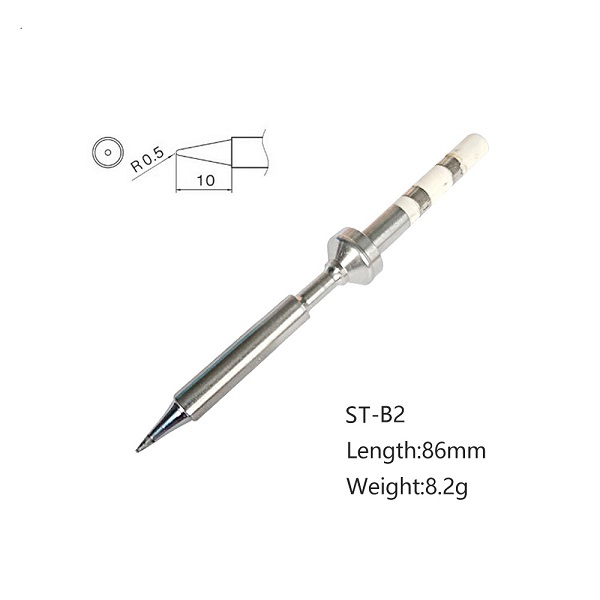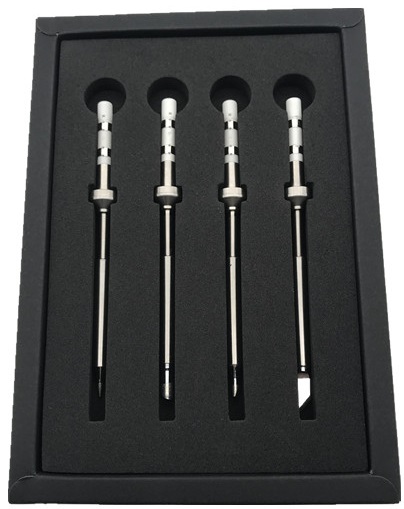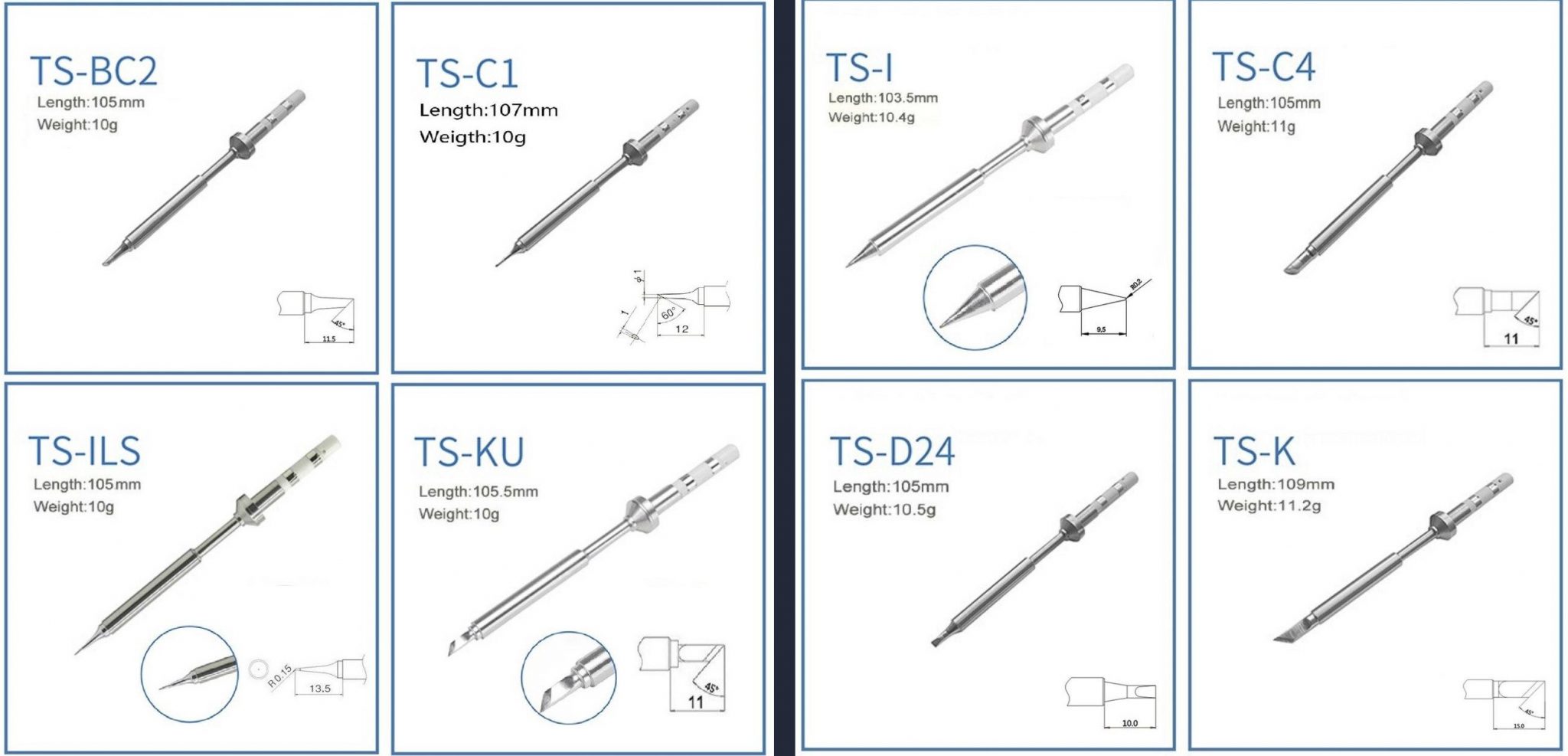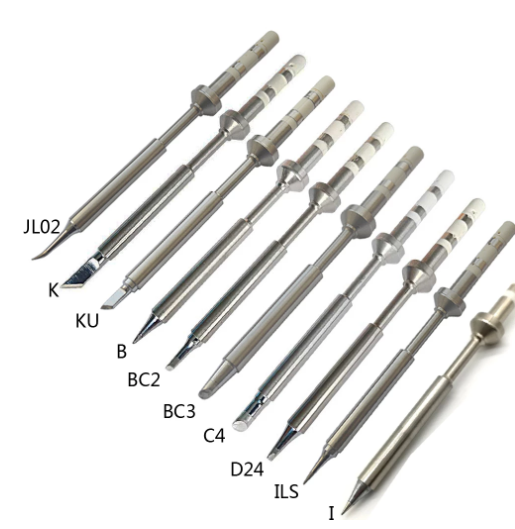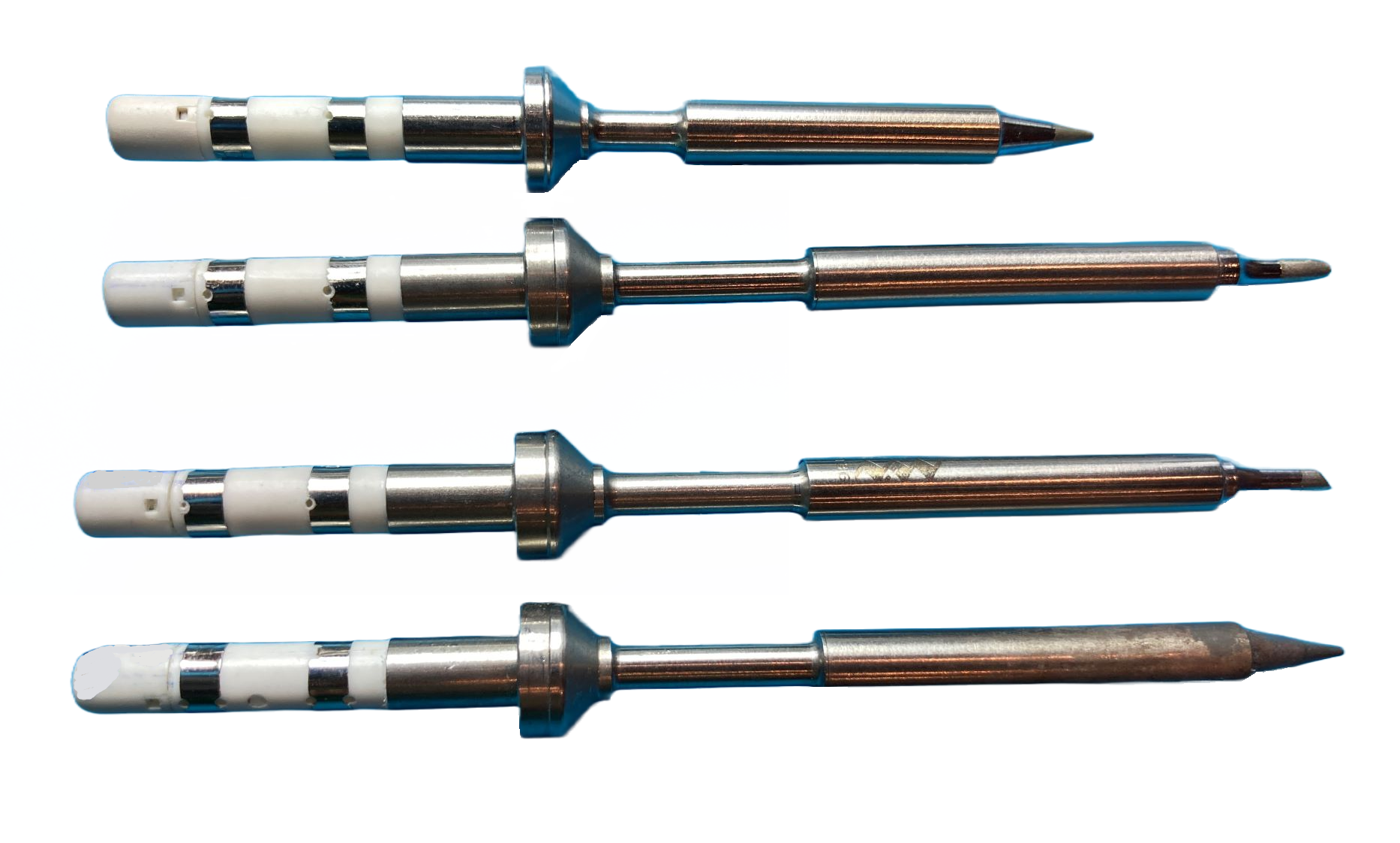Difference between revisions of "Pinecil Tips"
Jump to navigation
Jump to search
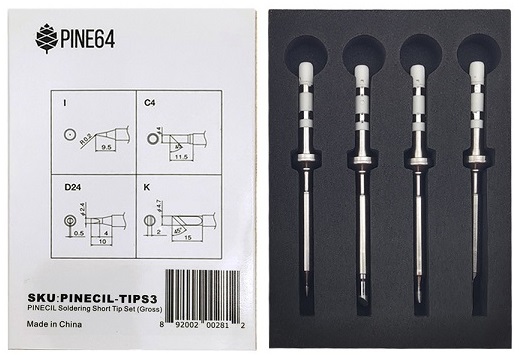
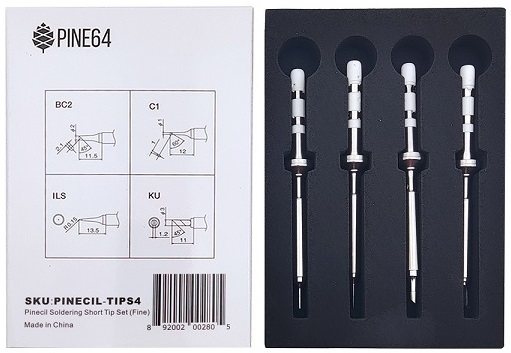
m |
|||
| Line 72: | Line 72: | ||
* Miniware long tip 8.0 Ω, new, standard length ts100 style | * Miniware long tip 8.0 Ω, new, standard length ts100 style | ||
* no brand long tip 8.3 Ω, lightly used, standard length ts100 style | * no brand long tip 8.3 Ω, lightly used, standard length ts100 style | ||
=== Go back to Pinecil article === | === Go back to Pinecil article === | ||
Go back to [[Pinecil]] article. | Go back to [[Pinecil]] article. | ||
[[Category:Pinecil]] | [[Category:Pinecil]] | ||
Revision as of 22:26, 16 February 2023
Pinecil Tips
What kind of tips work?
- Pinecil V2 uses both Pine64 designed Short Tips (ST line, 6.2-6.5 Ω) and TS-100 Normal length compatible tips (TS line, ~8.0 Ω).
- Presently, the V1 uses the normal length TS100 style tips (~8.0 ohms) until a firmware update enables manually switching the tip types. See notes below.
- Unplug before swapping tips as the V2 automatically detects the tip resistance at boot-up and it is safer.
How to increase tip life?
- Typically, lead solder uses a working temperature of ~300°C-320°C and no-lead solder ~350°C-365°C (check the temperature charts in the soldering guides or google it for your specific solder type, it varies). Always start lower than needed and increase ~5°C at a time until you reach a good working temperature. If you want your tips to last longer, use the lowest temperatures you can comfortably work at. Thicker wires, etc., may need more (adjust).
- The open source firmware allows you to use temperatures past the manufacturer limit, but that doesn't mean you should. That said, people have reported using the boost feature at 5-15 second burst to >430°C and have been perfectly fine (TS100 and Pine64 tips are readily available at reasonable prices and some people prefer convenience of higher temperatures and accept they might replace tips more frequently as a trade-off).
- Tips are not too expensive, some keep spare tips around and boost to high temperatures freely and often, and simply replace the tip when it loses the plating or the tip fails (common sign of tip failure is tip plating is gone, has pit holes, or a multimeter measures OL infinite ohms across the 2 silver contacts on the cold end of the tip).
- Check out this Soldering Guide article for more details on best practices for use and maintenance of tips.
Tips are rated by manufacturers to 400°C maximum. Boosting is unlocked on Ralim's open source IronOS firmware to 450°C. Running at higher than 400°C regularly could shorten the life of the tip, your luck may vary.
How does the tip work?
- Every tip contains a thermocouple; advantage is every new tip includes a brand new thermocouple.
- Pinecil tips are considered newer tech style. This is more accurate compared to older style Irons where the thermocouple is in the handle and much farther from the end of the tip.
- Science: what is a thermocouple?
- How is Tip Temperature measured in Ralim's IronOS firmware?
- What does the inside of a ts100 tip look like?
Pine Store Short & Normal length Tips
I. Short tips
Pay attention to the length! Pine Store sells two different lengths.
- All new Pinecil V2 soldering irons include a single Pine64 newly designed Short tip (ST-B2 conical).
- The discontinued V1 came with a longer normal length TS-B2 conical tip.
- Pine Store carries 4-Packs of Pine64 designed Short Tips (only Pine64 makes the short style presently)
- Short tips Fine link, white box (~6.2-6.5 Ω)
- Short tips Gross link, white box (~6.2-6.5 Ω)
- Pine64 Short tip packs are lower resistance/ohms which means higher performance and better ergonomics. Many professional irons have shorter tips for more control while soldering.
Note: Older Pinecil V1 can not use the short tips until firmware code is written to enable manual selection of 6.2 Ω or 8.0 Ω tip. Only the V2 model has the hardware to auto-detect the two kinds of tips short 6.2 Ω or regular length 8.0 Ω. If you would like to help with the code, see Github/IronOS.

Short Gross set, white box: ST-I, ST-C4, ST-D24, ST-K

Short Fine set, white box: ST-BC2, ST-C1, ST-ILS, ST-Ku
- The shorter tip is designed for higher performance and requires more power than longer traditional TS100 tips
- Recommend using minimum of usb-C PD65W-3.25A-20V or higher voltage charger when using Short tips (short tip draws more power than longer tips because of the lower ohms).
- For example with a PD65W-20V charger, the maximum watts with a standard 8 ohm tip is 50W, whereas the max watt with a 6.2 ohm tip is ~64 watts (watts/volts calculator).
- Heating formula: P = IV = I^2 * R = V^2 / R (⇧ watts = ⇧ faster heating)
20V @8Ω tip=50W; @6.2Ω tip=64.5W
24V @8Ω tip=72W; @6.2Ω tip=92.9W
II. Normal tips
Pay attention to the length! Pine Store sells two different lengths.
- Normal Length Gross Set here (~8.0 Ω)
- Normal Length Fine Set here (~8.0 Ω)
Currently, Pinecil V1 original uses the normal length ts100 style tips and not the newer Short tips designed for V2. Ralim is working on adding a feature to the firmware to allow people with the older V1 Pinecil to manually switch a profile setting which allows toggling between Normal Tip and Short tip profiles (adequate power supply must also be used min. PD65w 3.25A, 20V recommended). Check Github Ralim's IronOS for progress information. Always unplug when swapping tips.
Other compatible tips
Common resistances for tips:
- Pine64 short tip 6.2 Ω, new. Pine64 shorter length, only available at pine64.com.
- no brand long tip 7.9 Ω, new, standard length ts100 style
- Miniware long tip 8.0 Ω, new, standard length ts100 style
- no brand long tip 8.3 Ω, lightly used, standard length ts100 style
Go back to Pinecil article
Go back to Pinecil article.
